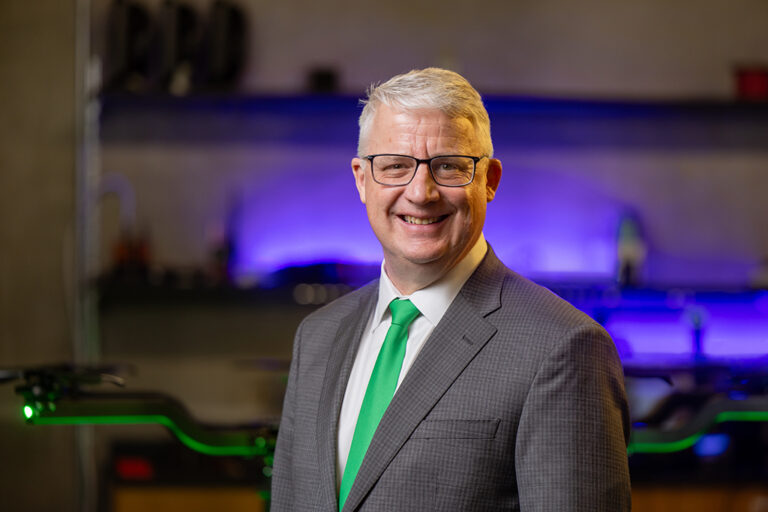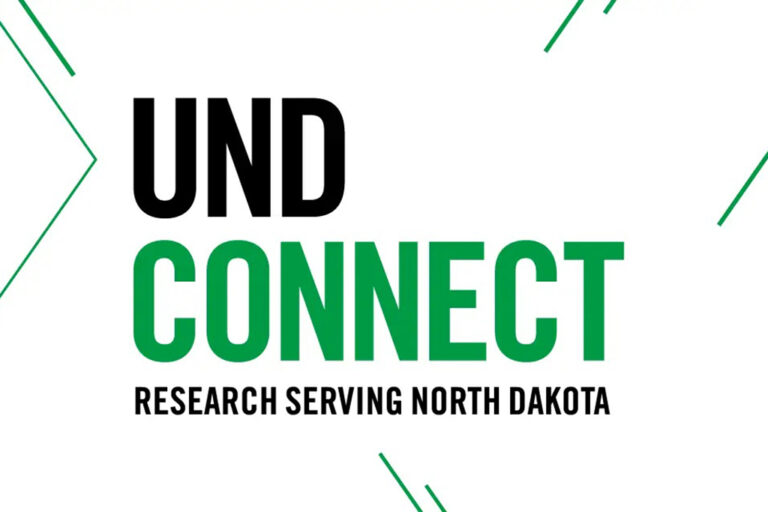Out of the lab, into the marketplace
Patent attorney Grant Adkins assists UND researchers with commercialization

As a patent attorney and former engineer, Grant Adkins possesses a blend of education, experience and expertise that make him uniquely qualified to serve as UND’s technology transfer and licensing associate within the Division of Research & Economic Development.

“My job is to help faculty and students at the University of North Dakota commercialize the research they do here,” said Adkins.
John Mihelich, Vice President for Research & Economic Development, sees Adkins as a key piece of supporting UND research.
“Grant is the point person for managing university IP (intellectual property) and a central part of our team in moving commercialization efforts forward, whether that is through licensing, developing through an industry-university partnership, or moving toward a startup company,” Mihelich said. “We work together to support researchers in their commercialization goals.”

For faculty and students interested in exploring the startup route, he points to the many resources available through the Center for Innovation.
“Our job is to provide entrepreneurial coaching and commercialization support to faculty and student researchers,” said Amy Whitney, Center director. “We want to help them take their idea into the marketplace, and help bring added value to their work and the University. Creating a start-up is one more opportunity for faculty and students to take their expertise and build on it outside of the classroom and their lab.”

Before starting with the University in April, Adkins was a patent examiner with the U.S. Patent & Trademark Office (USPTO) in Washington, D.C. He graduated from Vanderbilt Law School with a focus on intellectual property. Prior to becoming a patent attorney, he used his chemical engineering degree from the University of Florida to work for some of the biggest companies in the oil and gas industry in North Dakota’s Bakken oilfield.
As a patent attorney, Adkins reviewed technologies from numerous U.S. and international universities and companies, including semiconductor, polymer, oil and gas, nanofabrication, medical equipment and software technologies.
It wasn’t only Adkins’ professional connection to western North Dakota that brought him back to the state. He also has family here, having spent some of his childhood growing up in Napoleon, N.D., where his mother was born.
“I thought it would be a good way to use my engineering experience, my experience in patent law, my experience in the patent office, and be close to family,” Adkins said.
Adkins answered UND Today’s questions about how he can assist the University’s research community. This interview has been edited for clarity and length.
How does your knowledge of intellectual property and legal expertise assist UND researchers who might want to commercialize their technology or an idea?
My experience with intellectual property helps to build a relationship with faculty through education and outreach. Each situation is unique. It’s essential to understand both the law and the science behind the technology to develop a plan. Intellectual property law is not often intuitive, and I can help analyze a particular situation and discuss how it fits in the grand scheme of things. I’m here as a resource from the idea stage through licensing. We’re trying to provide a holistic solution to help commercialize the research going on at the University.
What have your interactions with UND researchers been like so far?
My interactions so far have been overwhelmingly positive. It is not unusual for me to spend over an hour speaking with a faculty member about the details of their situation. Faculty seem to appreciate my insight, the ability to ask detailed questions about the law, and my ability to give them answers based on their unique circumstances. Sometimes they reach out to me about a particular issue, and sometimes I reach out to them to learn more about their work. I also oversee material transfer agreements and non-disclosure agreements, so that is another way I interact with faculty. These interactions have helped me in getting a feel for the research portfolio on campus.

What are some of the misconceptions you deal with? What can you assist researchers with that they might not understand as well as they should?
I think the biggest misconception is the belief that pursuing patent protection is a way to validate research. Patents are simply one tool that can be used to protect intellectual property. The patenting system was not designed as a way to measure research quality, and it is not a useful tool for doing so. Our decision not to pursue patent protection, and the Patent Office’s decision not to issue a patent, is not a judgment on the quality of a researcher’s work. Patenting is not always the best solution.
Why wouldn’t a researcher want to get a patent?
Patenting takes a lot of resources, and it requires disclosing an invention to the public. It costs on the order of $15,000 to $20,000 to get a patent. And it takes about two to three years on average – sometime four. Expect to spend a lot of time helping the patent attorney understand your invention and get through the patenting process. Further, in technology areas that are constantly changing, a patent may lose its value by the time it is received.
Disclosing the invention to the public may result in effectively giving away intellectual property. For example, if your technology is a method of manufacturing, a company may use your process, and you may never know about it. It may very well be better to avoid patenting in these circumstances and keep your intellectual property held as a trade secret.
What else do you want UND researchers to know about what you do?
Commercializing research is not easy, so we need to have a real team effort. We can develop a plan for intellectual property protection, produce marketing materials, make contacts in the industry, and write licensing agreements. We can help with a business plan and pursuing small business funding. However, the most crucial aspects of commercialization success are things we cannot do.
Only our researchers can take on the difficult task of developing technologies that are superior to the solutions in the marketplace. Long-term investigator-industry relationships are far better for commercializing research than our office making contacts afterward. And nobody understands or can communicate a researcher’s technology to interested companies as well as the researcher can.



